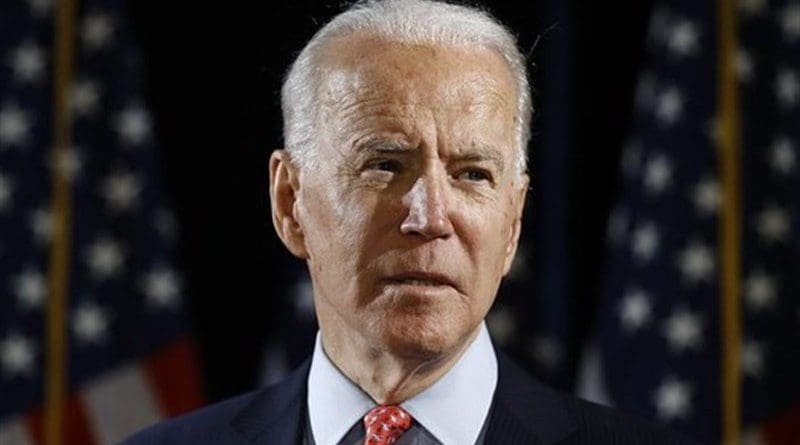Biden On Trade: Same Policy, Different Tone? – Analysis
By Bryan Mercurio*
US President Donald Trump has changed the direction of trade discussions in the United States and the impact of his term in office will continue to influence policy throughout President-elect Joe Biden’s term. Biden’s policies naturally align with those of Trump’s and to some degree will simply pick up from where Trump finishes.
Domestic issues, such as middle-class incomes, jobs and manufacturing will remain at the centre of trade policymaking. Biden is an economic nationalist, emphasising the need for enhanced ‘Buy American’ policies, domestic manufacturing and preparedness for future health pandemics. But Biden will seek to re-engage the international community and reclaim the United States’ position at the top. Biden is a multilateralist and as a senator demonstrated deep interest in global relations. Biden is likely to view trade through the prism of foreign policy and will review Trump’s trade measures to uncover their effectiveness — including tariffs, export controls, sanctions, national security exceptions, trade remedy investigations and antagonism towards the World Trade Organization (WTO).
Trade is a historically combative issue in US politics, and Biden will proceed with caution and would be wise to approach the issue holistically. He can start with domestic policies including innovation and tax, and then link trade to broader economic and geopolitical objectives. Trade measures alone simply cannot reshape the domestic economy or deliver for many middle-class voters. By viewing trade as part of a broader policy, Biden could gain the space needed to formulate a modern and progressive trade policy.
Biden’s trade policy may take time to emerge as his nominee for US Trade Representative Katherine Tai could take months to be confirmed and Trade Promotion Authority (TPA) expires in July 2021. The administration must also obtain congressional support for its trade policy. Biden will have to reach a balance between trade liberalisation with domestic priorities and contemporary trade-related issues which interest members of Congress, including opposition to investor-state dispute settlement, digital trade, currency manipulation, climate change, labour and gender. Biden will also have to decide whether to continue using unilateral national security measures under Section 232 of the Trade Expansion Act , particularly against allies and partners.
Re-joining the Trans-Pacific Partnership (TPP) would signal that the United States is ready to regain its leadership role and respond to the recently signed Regional Comprehensive Economic Partnership (RCEP) between ASEAN and five partner countries, including China. But Biden has not made re-joining the agreement a priority given the difficulties he will face garnering support for the move.
Biden could seek to create an enhanced and renamed agreement, allowing him to enter the TPP through a backdoor. He could emulate President Trump who harshly criticised the North Atlantic Free Trade Agreement but essentially rebranded it the United States–Mexico–Canada Agreement. But the strong and growing support for protectionism among Democrats and aversion to free trade policies among Republicans may make the negotiation of a mega-regional trade agreement difficult if not impossible.
It is expected that the Biden administration will be constructive and re-engage with the multilateral trading system through the WTO. Biden could seek to regain US leadership status with simple moves — starting with allowing the appointment of Ngozi Okonjo-Iweala as Director-General. Biden should also allow for appointments on the Appellate Body, effectively incapacitated since the United States began blocking all new appointments. Discussions could focus on completing niche but difficult agreements, such as on fisheries subsidies, e-commerce and environmental goods.
China will continue to feature prominently in US trade policy, with the incoming administration sharing Trump’s concerns over China’s use of subsidies, industrial overcapacity, state-owned enterprises and national security. President Trump’s trade war with China included unilateral tariffs, bans and eventually a so-called ‘phase one’ trade deal which includes purchase commitments and other areas of managed trade.
Biden will continue this tough stance but take a more multilateral approach in engaging with China. Biden will seek to develop a cooperative approach with allies. He will seek to reform the rules on subsidies and other issues at the WTO to create what it sees as a more level playing field. If Biden can successfully navigate this process, China may view the rebalancing not so much as a threat but more so an opportunity to buttress its position as a global leader.
US unilateralism will also continue. Biden will likely continue using Section 301 of the US Trade Act to target perceptively unfair trade practices. These measures enjoy strong bipartisan support and Biden will undoubtedly view them as key pieces of protecting and enhancing domestic manufacturing. Given that China’s phase one purchase commitments are unrealistic, Biden may seek to reduce China’s import burden in exchange for increased commitments in areas such as intellectual property, financial services, human rights and the environment.
Trade friction will continue throughout Biden’s presidency and will not significantly depart from Trump’s policies. But as a globalist and coalition builder, the method and tone will change, and with it perhaps the results. The domestic economy, jobs, manufacturing, investment, ‘Buy American’ and tax policies will form the centrepiece of Biden’s economic plan. Issues of labour, environment/climate change and gender will also feature more prominently in the incoming regime.
Trade policy under Biden will become more strategic, predictable and cooperative. This does not guarantee success, but if well managed there is an opportunity for Biden to establish a trade legacy by shifting US trade policy, reforming the multilateral system and rebalancing US–China relations.
*About the author: Bryan Mercurio is the Simon F S Li Professor of Law at the Chinese University of Hong Kong.
Source: This article was published by East Asia Forum

